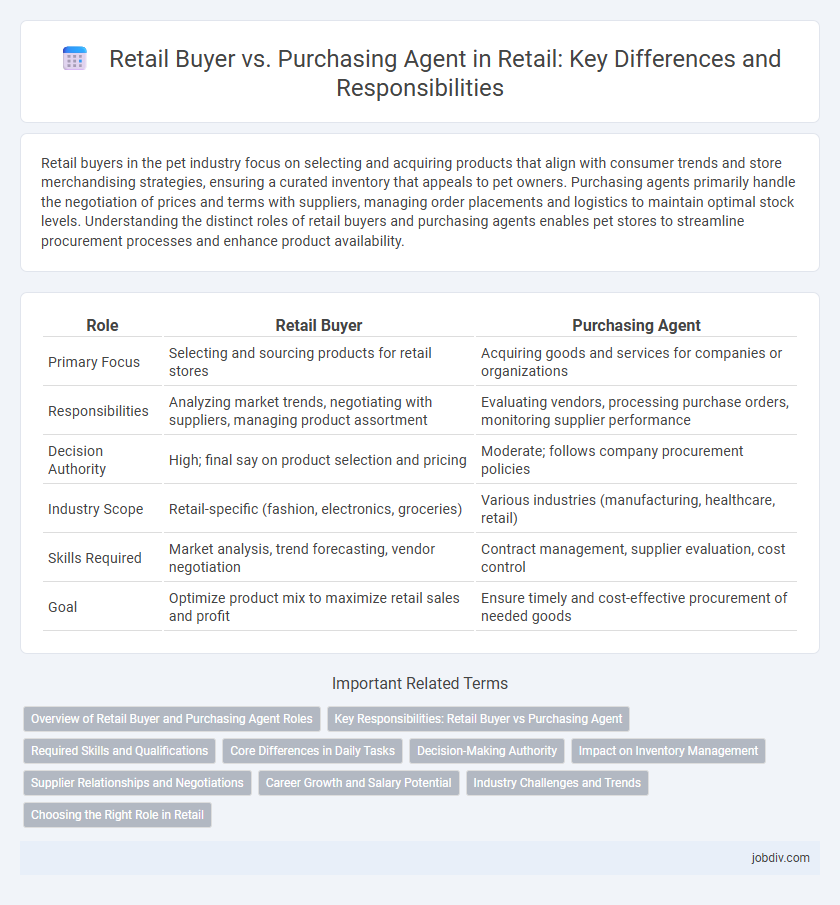Retail buyers in the pet industry focus on selecting and acquiring products that align with consumer trends and store merchandising strategies, ensuring a curated inventory that appeals to pet owners. Purchasing agents primarily handle the negotiation of prices and terms with suppliers, managing order placements and logistics to maintain optimal stock levels. Understanding the distinct roles of retail buyers and purchasing agents enables pet stores to streamline procurement processes and enhance product availability.
Table of Comparison
| Role | Retail Buyer | Purchasing Agent |
|---|---|---|
| Primary Focus | Selecting and sourcing products for retail stores | Acquiring goods and services for companies or organizations |
| Responsibilities | Analyzing market trends, negotiating with suppliers, managing product assortment | Evaluating vendors, processing purchase orders, monitoring supplier performance |
| Decision Authority | High; final say on product selection and pricing | Moderate; follows company procurement policies |
| Industry Scope | Retail-specific (fashion, electronics, groceries) | Various industries (manufacturing, healthcare, retail) |
| Skills Required | Market analysis, trend forecasting, vendor negotiation | Contract management, supplier evaluation, cost control |
| Goal | Optimize product mix to maximize retail sales and profit | Ensure timely and cost-effective procurement of needed goods |
Overview of Retail Buyer and Purchasing Agent Roles
Retail buyers analyze market trends and consumer preferences to select and purchase merchandise that maximizes sales and profitability for retail stores. Purchasing agents negotiate with suppliers and manage procurement processes to ensure timely acquisition of goods at competitive prices, maintaining inventory levels. Both roles are critical in supply chain efficiency but differ in strategic focus, with retail buyers emphasizing product assortment and consumer demand, while purchasing agents concentrate on vendor relations and order fulfillment.
Key Responsibilities: Retail Buyer vs Purchasing Agent
Retail Buyers analyze market trends and customer preferences to select merchandise that aligns with store demand, negotiate with suppliers for favorable pricing, and manage inventory levels to maximize profitability. Purchasing Agents primarily execute procurement orders based on specifications provided by retail buyers, ensure timely delivery of goods, and maintain vendor relationships to support supply chain efficiency. Both roles collaborate closely but differ as buyers strategize product assortment while purchasing agents handle transactional purchasing and logistics.
Required Skills and Qualifications
Retail buyers require strong analytical skills, market trend knowledge, and excellent negotiation abilities to select products that maximize sales and profitability. Purchasing agents need expertise in supply chain management, contract negotiation, and vendor relations to ensure timely procurement and cost efficiency. Both roles demand effective communication, attention to detail, and proficiency in inventory management software.
Core Differences in Daily Tasks
Retail buyers focus on selecting and acquiring products that align with consumer trends and store strategies, emphasizing market analysis and supplier negotiation. Purchasing agents concentrate on the transactional process, managing purchase orders, supplier relationships, and ensuring timely delivery to maintain inventory levels. Buyers strategize product assortments and pricing, while purchasing agents handle operational procurement and logistics.
Decision-Making Authority
Retail buyers hold greater decision-making authority than purchasing agents, as they are responsible for selecting products, negotiating prices, and finalizing contracts with suppliers. Purchasing agents typically execute the buying decisions set by retail buyers, focusing on order placement and supplier communication. This distinction ensures retail buyers drive strategic procurement, while purchasing agents manage operational purchasing tasks.
Impact on Inventory Management
Retail buyers strategically select products based on market trends, directly influencing inventory turnover rates and stock variety. Purchasing agents execute procurement orders, ensuring timely supplier deliveries that maintain optimal inventory levels and prevent stockouts. Effective collaboration between retail buyers and purchasing agents enhances inventory accuracy and responsiveness to consumer demand fluctuations.
Supplier Relationships and Negotiations
Retail buyers develop strategic supplier relationships to secure exclusive products, leveraging market trends and consumer insights for competitive advantage. Purchasing agents focus on executing transactions, managing order details, and ensuring timely deliveries within budget constraints. Both roles require negotiation skills, but retail buyers emphasize long-term partnerships while purchasing agents prioritize cost efficiency and contract compliance.
Career Growth and Salary Potential
Retail buyers typically experience faster career growth due to their strategic role in selecting merchandise and shaping product assortments, with median salaries ranging from $60,000 to $90,000 annually depending on experience and location. Purchasing agents tend to have more stable but slower advancement opportunities, often focusing on procurement and supplier negotiations, earning between $50,000 and $75,000 per year. Both roles offer industry-specific skills, but retail buyers generally achieve higher salary potential linked to their influence on sales performance and consumer trends.
Industry Challenges and Trends
Retail buyers face challenges in demand forecasting and consumer behavior shifts, requiring advanced analytics to optimize inventory levels and product assortments. Purchasing agents encounter supplier disruptions and cost volatility, driving the need for strategic sourcing and supply chain resilience. Both roles must adapt to trends like omnichannel retail and sustainability mandates to remain competitive in the evolving retail landscape.
Choosing the Right Role in Retail
Retail buyers analyze market trends, negotiate with suppliers, and select products that align with consumer demand, making strategic decisions to optimize inventory and drive sales. Purchasing agents focus on the logistical aspects of procurement, managing supplier relationships, placing orders, and ensuring timely delivery of goods to support retail operations. Choosing the right role depends on whether one prefers strategic product selection and market analysis (retail buyer) or operational procurement and supplier management (purchasing agent).
Retail Buyer vs Purchasing Agent Infographic

 jobdiv.com
jobdiv.com